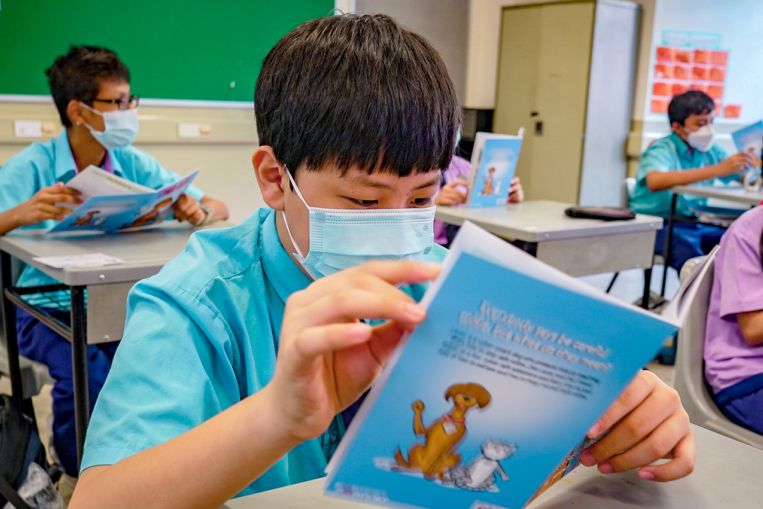SINGAPORE – How do you keep a thief out? By locking the door, because doing so means crooks are likely to try breaking into another home instead.
In the same vein, passwords are like locks but for digital content. And just like toothbrushes, pick a good password, change it regularly and never share it with others.
These are some ways a new children’s book being given to the libraries of all primary and special education schools here tries to help educate pupils on protecting themselves from cyber-security threats.
About 2,000 copies of the book are being given free to more than 200 schools, including 186 primary schools and 19 special education schools.
The initiative was announced on Monday (Nov 8), which is Singapore Cyber Day, by cyber-security firm Fortinet as part of the Association of Information Security Professionals’ (AiSP) CyberFest series of cyber-security events and initiatives this week.
Titled Cyber Safe: A Dog’s Guide To Internet Security, the book is centred on Lacey the dog who teaches her cat friend Gabbi how to use the Internet safely.
Done in comic-book style, it covers topics such as what the Internet can be used for and not talking to strangers online.
Released in March, it was written by two mothers, Fortinet’s deputy chief information security officer Renee Tarun and United States National Board-certified teacher Susan Burg.
AiSP and Fortinet said that it is important for young people to receive proper guidance and support about cyber security at an early age.
“More children are online for prolonged periods of time and online learning has become a way of life, so it is especially important to educate our youth on Internet safety,” said Ms Jess Ng, Fortinet’s country head for Singapore and Brunei.
She said that with many Internet-connected devices used for home-based learning amid the Covid-19 pandemic, there are opportunities for cyber criminals to conduct cyber attacks, such as stealing information and installing malware.
In April last year, at the start of the two-month circuit breaker here, the Ministry of Education temporarily stopped teachers from using video-conferencing platform Zoom to conduct lessons for home-based learning after “very serious incidents” occurred.
One involved hackers hijacking a streamed geography lesson and showing the class of Secondary 1 students obscene images, as well as making lewd comments.
Said Ms Ng: “Young children are an especially vulnerable target for cyber criminals due to their little understanding of cyber crime. The Cyber Safe book aims to protect children by teaching them from an early age how to behave and keep themselves safe online.”
The book also includes a parent’s guide with details on what they should be aware of when their children are online, such as not opening e-mails from strangers.
The first school to receive the free books last month was Grace Orchard School. The special education school caters to students aged seven to 18 who have been diagnosed with mild intellectual disability and those with mild autism spectrum disorders.

“With greater exposure to the digital world, cyber security is no longer an option, especially for our students with special needs,” said school principal Lisa Choy.
Ms Choy said the Cyber Safe book will be a good resource for teachers to educate students and complements the school’s existing digital literacy resources.
“It is written in a comic style, which is very attractive to students,” she said, adding that the book is accessible as it does not have many words.
- The paperback version of the Cyber Safe book costs US$7.50 (S$10.15) while the e-book costs US$3.99. To buy a copy, visit this website.













































